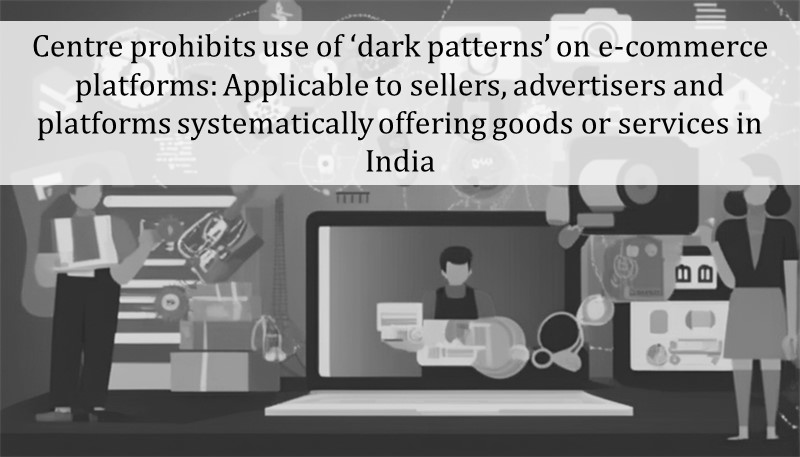Centre prohibits use of ‘dark patterns’ on e-commerce platforms: Applicable to sellers, advertisers and platforms systematically offering goods or services in India

The Central Consumer Protection Authority (“CCPA”) has notified Guidelines for Prevention and Regulation of Dark Patterns, 2023 (“Guidelines”) with a view to prohibit any person or platform from engaging in dark pattern practices. The Guidelines are have gained effect since 30th applicable to all platforms which are systematically offering goods or services in India.
“Dark Patterns” have been defined to mean any practices or deceptive design pattern using user interface or user experience interactions on any platform that is designed to mislead or trick users to do something they originally did not intend or want to do, by subverting or impairing the consumer autonomy, decision making or choice, amounting to misleading advertisement or unfair trade practice or violation of consumer rights.
What qualifies as dark patterns are provided below:
- False Urgency – means falsely stating or implying the sense of urgency or scarcity so as to mislead a user into making an immediate purchase or take an immediate action, which may lead to a purchase.
- Basket Sneaking – means inclusion of additional items such as products, services, payments to charity/donation at the time of checkout from a platform, without the consent of the user, such that the total amount payable by the user is more than the amount payable for the product(s) and/or service(s) chosen by the user. Provided that the addition of free samples or providing complimentary services or addition of necessary fees disclosed at the time of purchase, shall not be considered basket sneaking.
- Confirm shaming – means using a phrase, video, audio or any other means to create a sense of fear or shame or ridicule or guilt in the mind of the user, so as to nudge the user to act in a certain way that results in the user purchasing a product or service from the platform or continuing a subscription of a service.
- Forced Action - mean forcing a user into taking an action that would require the user to buy any additional good(s) or subscribe or sign up for an unrelated service, in order to buy or subscribe to the product/service originally intended by the user.
- Subscription Trap – means the process –
- of making cancellation of a paid subscription impossible or a complex and lengthy process; or
- hiding the cancellation option for a subscription; or
- forcing a user to provide payment details and/or authorization for auto debits for availing a free subscription
- making the instructions related to cancellation of subscription ambiguous, latent, confusing, cumbersome
- Interface interference – means a design element that manipulates the user interface in ways that (a) highlights certain specific information; and (b) obscures other relevant information relative to the other information; to misdirect a user from taking an action desired by her.
- Bait and switch – means the practice of advertising a particular outcome based on the user’s action but deceptively serving an alternate outcome.
- Drip pricing – means a practice where by
- elements of prices are not revealed upfront or are revealed surreptitiously within the user experience; or
- revealing the price post-confirmation of purchase, i.e. charging an amount higher than the amount disclosed at the time of checkout; or
- a product or service is advertised as free without appropriate disclosure of the fact that the continuation of use requires in-app purchase; or
- a user is prevented from availing a service which is already paid for unless something additional is purchased
- Disguised advertisement – means a practice of posing, masking advertisements as other types of content such as user generated content or new articles or false advertisements, which are designed to blend in with the rest of an interface in order to trick customers into clicking on them.
- Nagging – means a dark pattern practice due to which a user is disrupted and annoyed by repeated and persistent interactions, in the form of requests, information, options, or interruptions, to effectuate a transaction and make some commercial gains, unless specifically permitted by the user.
- Trick Question – means the deliberate use of confusing or vague language like confusing wording, double negatives, or other similar tricks, in order to misguide or misdirect a user from taking desired action or leading consumer to take a specific response or action
- Saas billing – refers to the process of generating and collecting payments from consumers on a recurring basis in a software as a service (SaaS) business model by exploiting positive acquisition loops in recurring subscriptions to get money from users as surreptitiously as possible.
- Rogue Malwares – means using a ransomware or scareware to mislead or trick user into believing there is a virus on their computer and aims to convince them to pay for a fake malware removal tool that actually installs malware on their computer.
Background:
Earlier this year, in September 2023, the Department of Consumer Affairs sought feedback on the Draft Guidelines for Preventing and Regulating Dark Patterns, as detailed in the email trail. Now, the CCPA has officially notified the Guidelines for Preventing and Regulating Dark Patterns.